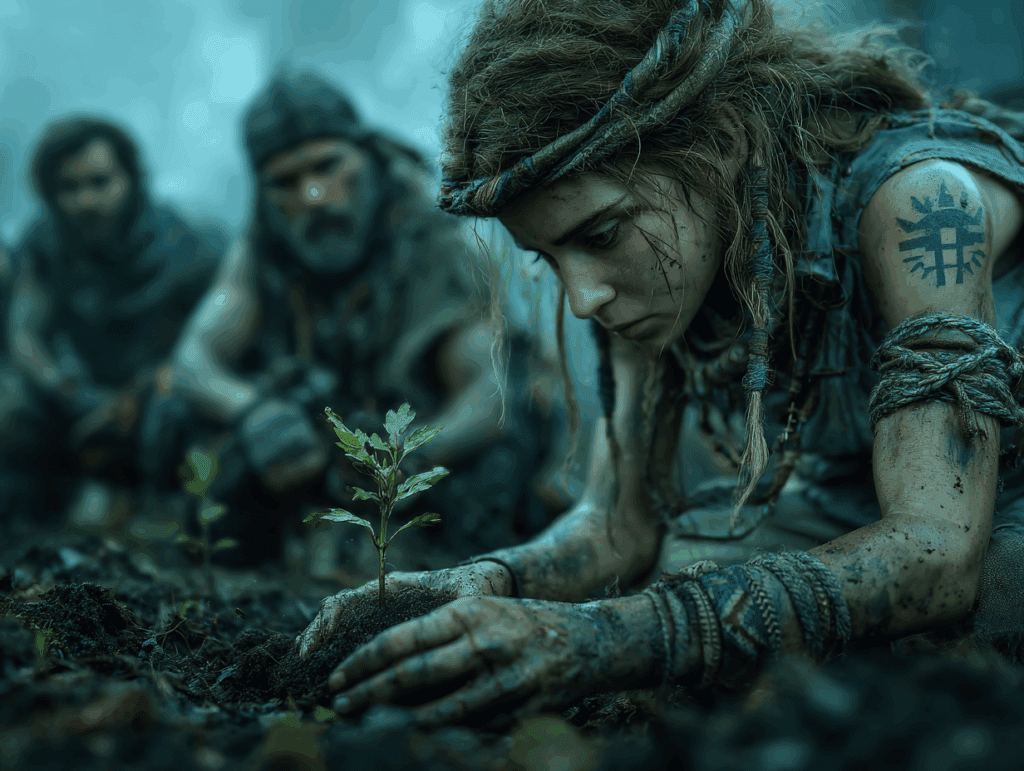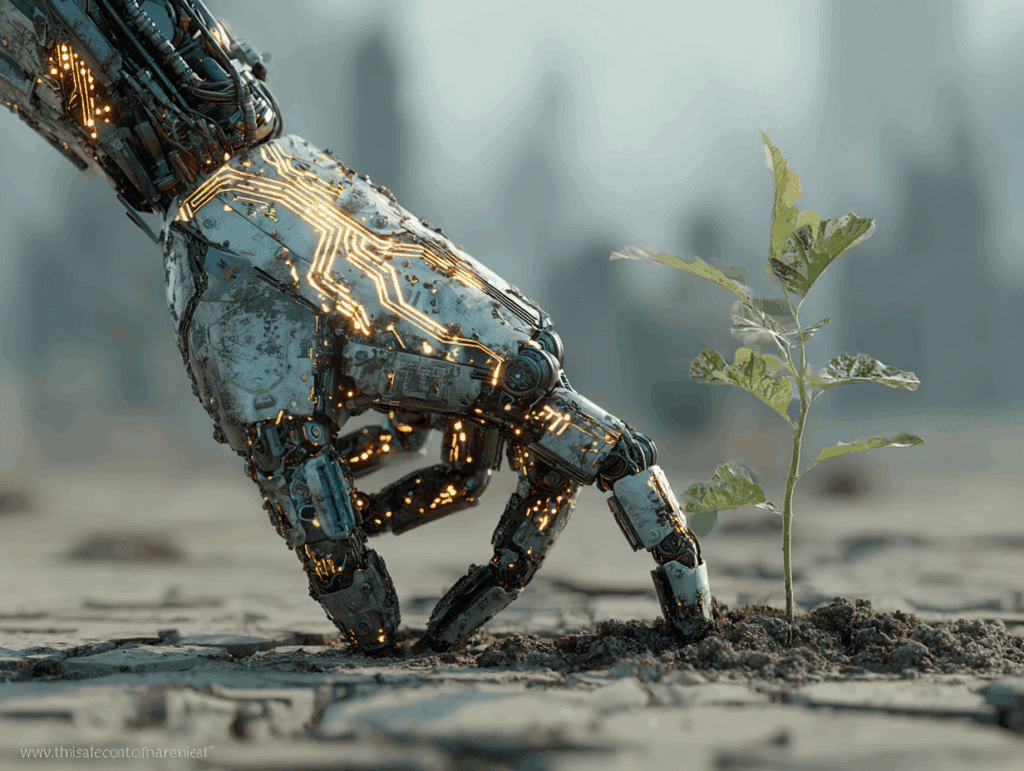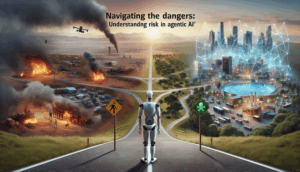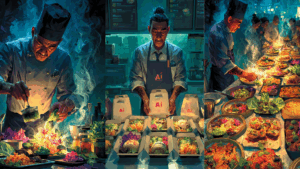The sun hadn’t fully crested the hills when the village stirred. Smoke curled from the fading embers of last night’s fire. Children still slept, curled like pups, while the hunters laced rawhide around their spears, preparing to vanish into the forest again. Hunger had settled into the bones of the tribe like a second skin. It had been three days since their last successful hunt.
In the center of the clearing, Tarn, the most seasoned hunter, tightened his grip on his spear. Weathered, proud, and never without a story of a near miss, Tarn spit into the dirt and muttered to no one in particular, “If we don’t track that mammoth herd soon, we’ll be roasting bark.”
A few steps away, Eru crouched low to the earth, her fingers dusty with soil. She wasn’t sharpening a spear or fletching arrows. She was planting.
Planting.

Kael, the loud one, laughed. “You’re burying perfectly good seeds? Why not just toss our food into the river and dance around it for luck?”
Eru didn’t flinch. She pressed another seed into the earth and covered it gently. “I’m not throwing it away. I’m investing.”
Kael rolled his eyes so hard his whole body joined in. “In what? Dirt?”
Tarn stepped closer, arms crossed, the firelight catching the hard lines of his face. “And what if it doesn’t grow, Eru? What if we wait and wait and still have nothing? You can’t eat patience.”
She looked up, calmly. “And what if it does grow? What if we don’t have to chase our dinner anymore?”
The men scoffed, but Rian, the quiet boy who’d never quite mastered spear-throwing, edged closer to Eru. He watched her movements carefully, saw the intention in every gesture. To him, it didn’t look like foolishness. It looked like hope.
The discussion spilled into the village like boiling water. Some laughed, others whispered. A few elders furrowed their brows. “The world provides,” they warned. “Tampering with the earth is dangerous. It’s not our place.”
Eru didn’t argue. She just kept planting. Day by day. Quietly. Faithfully. Even as Kael tossed mocking jabs. Even as Tarn shook his head and marched into the forest again.
Weeks passed.
The forest yielded less. Bellies grew tighter. Spirits, tenser.
Then, one morning, where the soil had been disturbed, a green sprout rose—timid but triumphant.
The village gathered around it, silent.
Tarn scratched his beard. “Could be luck.”
Kael, for once, had nothing to say.
And Rian whispered, “Could be the future.”
“When the mammoths stopped coming, not everyone saw it as the end. Some saw it as the beginning.”
That was the day the tribe stopped chasing and started cultivating. Not just food—but time, thought, and eventually, everything else we now call civilization.”
Losing the Job You Loved: When Change Hits Close to the Chest
The green patch near the center of the village had grown thick with shoots—beans, grains, and strange leafy things that no one had names for yet. Meals were changing. So was the rhythm of the day. Fewer hunting parties went out. Fewer foraging baskets came back full.
Tarn still left with his spear at dawn. Habit, mostly. He moved through the woods with the same precision, the same patience, but even he could feel it—fewer eyes waiting on him when he returned. No one rushed to ask what he’d caught. They were full already.
And then there was Kael.
The loudmouth. The mocker. The man who once said seeds were food funerals.
He had always made himself useful. He could throw a spear, climb a tree, chase down a squirrel if need be. But now, no one was asking him to. One morning, he rose to the sound of children laughing near the grain stores—the grain he once ridiculed. The grain that was now more reliable than his bow.
He spent that morning walking laps around the garden, arms folded, kicking loose stones. Eru ignored him, tending to her rows. He cleared his throat. Twice. Then finally muttered:
“So, this stuff. It just… grows?”
Eru didn’t look up. “If you help it.”
That afternoon, Kael tried pulling weeds. He tore out three good sprouts by mistake and earned a groan from Eru, but she didn’t scold. She handed him a dull stone and showed him how to grind the grain. It wasn’t heroic. It wasn’t thrilling. But it was something.
And Kael was tired of doing nothing.
By the third day, his jokes had softened. By the fifth, he was figuring out how to dig smarter rows. By the seventh, he had ideas.
“Hey,” he said to Eru, “What if we built a wall of stones over there to stop the wind? Might help the sprouts stand taller.”
Eru paused, considered, and nodded once. “Try it.”
That night, Kael sat by the fire—not boastful, not bitter, just quiet. He rubbed his hands, calloused in new ways, and looked over at Tarn.
“Strange how hard it is to change when you’ve spent your life proving yourself useful in only one way.”
Tarn didn’t reply. He just stared into the flames.
But Kael?
Kael was already starting to imagine what else he might be good at.
“The greatest threat to a way of life isn’t that it ends—it’s that it asks us to begin again, with no guarantee we’ll succeed.”
What Grows After the Job is Gone: How New Roles Take Root
It didn’t happen all at once.
There was no declaration, no ceremony. Just the slow rearranging of life.
With the hunters no longer sprinting out at dawn and the gatherers no longer vanishing into the woods, the village became… still. For the first time in living memory, people had something foreign in their day: time.
Tarn spent a lot of it pacing. His legs didn’t like being idle, but there were only so many spears to sharpen, so many trees to track. One morning, he found himself helping Kael move stones for windbreaks. It wasn’t hunting, but it was useful—and, strangely, it felt good.
And then something odd happened.
The quiet boy, Rian, who had once tripped over his own feet chasing rabbits, picked up a stick and began scratching into a flat stone. Not hunting plans. Not maps. Patterns. Spirals. Scenes. His fingers moved with rhythm, with care, with intention.
“What’s that supposed to be?” Kael asked one evening, peering over Rian’s shoulder.
“A story,” Rian said. “Of the first seed.”
Kael blinked. “And what do you plan to do with it?”
Rian smiled. “Tell it.”
Nearby, a girl hummed softly while tending the grain. Not a chant for work. A tune. Light, delicate, rolling like the breeze. People started listening. Then humming. Then joining in.
And just like that, a singer was born.
More followed.
A boy who’d always been clumsy with tools began tying reeds into shapes no one had thought to make before. A woman began keeping track of weather patterns in bone scratches. Someone started teaching the little ones how to count sprouts, then how to count everything.
New kinds of work were blooming.
Not for survival—but for meaning.
They weren’t just living longer. They were living deeper.
“When survival stops taking all your time, something strange happens: your mind looks for more.”
More connection. More understanding. More expression.
Tarn watched it all unfold from the fire circle, eyes soft. He still hunted. Sometimes. But only when he wanted to. Not because he had to.
And Kael?
He was drawing garden blueprints in the dirt, arguing about water flow with Rian, and getting scolded by Eru for calling every new plant “leafy grain junior.”
They were laughing more these days.
“Disruption feels like loss when you only measure what’s gone. But look closely—and you might see it’s just making room for what was never before possible.”
Agentic AI and the Future of Work: Are You the Hunter or the Gardener?
As Agentic AI begins taking on more responsibility in today’s workplaces, many wonder: what happens to the jobs it replaces? This isn’t the first time we’ve faced such a shift. Thousands of years ago, humans traded spears for seeds—and unlocked an explosion of creativity and culture. Here’s what that story can teach us now.
Fast forward a few thousand years.

We’ve swapped spears for smartphones, berries for barcodes, and tribal campfires for Slack threads. But the feeling? It’s oddly familiar.
Because once again, something has arrived that threatens to upend the way we work.
Agentic AI.
It’s not just another tool. It doesn’t just wait quietly for instructions. Agentic AI observes, reasons, makes decisions, and pursues goals with minimal hand-holding. It’s the digital equivalent of Eru planting seeds while everyone else was still chasing mammoths—and just like back then, the reactions are predictable.
The modern Tarn frowns at his keyboard. “What’s left for me if AI does the planning?”
The contemporary Kael posts memes online about being replaced by robots, half-joking, half-panicked. (And ironically, his meme is now being written by a generative model.)
The skeptics wonder if this is just a tech fad. The deniers insist that human intuition can never be mimicked. And the pioneers? They’re quietly building, testing, adapting.
And like before, there is fear.
Because if you’ve built your identity on executing checklists, writing reports, doing predictable things in predictable ways—Agentic AI feels like a threat. It feels like a green sprout rising where you never expected to see one. A whisper that your role might not be needed the way it once was.
But—and this is key—that’s not the same as saying you won’t be needed at all.
In fact, you might be needed in entirely new ways.
Agentic AI, like farming, frees us from survival tasks—manual data entry, mundane coordination, copy-paste creativity—and opens space for strategic thinking, meaningful collaboration, even rest. It’s not the end of work. It’s the rewilding of human imagination.
Just like Kael, those willing to step in, get their hands dirty, and learn something new may discover skills they didn’t know they had. Not everyone will become a coder. But some will become:
- AI behavior designers
- Human-AI collaboration coaches
- Workflow ethicists
- Narrative engineers
- Curators of meaning in a world flooded with content
These aren’t sci-fi roles. They’re already emerging, sprouting quietly at the edges of industries.
And if your job mostly involves forwarding emails, formatting slides, and nodding in status meetings—Agentic AI is already doing it faster, friendlier, and without a coffee break.
“Every technological leap asks the same question: will you chase the mammoth, or will you plant something new?”
Agentic AI doesn’t erase your worth. It invites you to expand it.
And just like before, the real transformation isn’t in the tools.
It’s in us.
The Choice Before Us
Every great turning point in human history starts the same way: with discomfort.
Someone loses their job. Someone feels left behind. Someone else sees a possibility and digs their fingers into the dirt.
Agentic AI is our next turning point. And while the mammoths we’re chasing today look like spreadsheets, email threads, and project pipelines, the choice is remarkably similar: keep running—or start planting.
This isn’t about romanticizing disruption. It’s about recognizing the space it creates for reinvention. The time it gives us to explore curiosity, creativity, and collaboration instead of just checking boxes to survive another day.
So ask yourself:
- What could you grow with the time you’re about to get back?
- What new role could you imagine for yourself if you stopped trying to preserve the old one?
Because the future doesn’t belong to the fastest hunter.
It belongs to those willing to become gardeners of the unknown.
The sprout is already rising.
What will you do with it?




